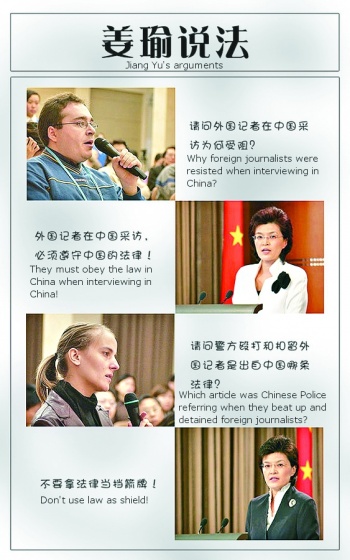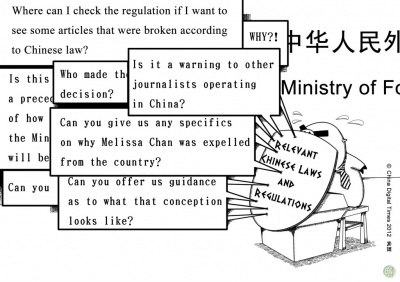Law is not a shield
来自China Digital Space
法律不是挡箭牌 (fǎlǜ bú shì dǎngjiànpái): the law is not a shield
This statement was made by Jiang Yu, the Foreign Ministry Spokesman.
During China’s short-lived attempt at following the “Jasmine Revolutions” of the Middle East, foreign journalists attempting to cover the “revolution” were roughed up by police. At a press conference, journalists asked what law they had violated. The following are Jiang Yu’s comments, translated by Human Rights in China:
Question: Can you clearly tell us the specific clause of Chinese law that we have violated?
Answer: The violation is of relevant regulations regarding the need for an application when going places to interview people. Don’t use the law as a shield. The real problem is that there are people who want to see the world in chaos. They want to make trouble in China. For people with these kinds of motives, I think no law can protect them. I hope everyone will sensibly recognize this problem. If you truly are reporters, then you should behave in accordance with the journalists’ professional standards. While in China you should respect China’s laws and regulations. Looking at the past two situations, those journalists who were waiting for something to happen did not get the news they expected. If during those two days there were people who incited and instigated you to go somewhere for an illegal assembly, I suggest that you promptly report that to the police, in order to, one, protect Beijing’s law and order, and two, protect your own safety, rights, and benefits:
Jiang’s comments were extremely controversial, leaving many netizens wondering “what good is the law if it doesn’t protect us?” Perhaps the most notable response to Jiang Yu’s comments was an editorial in Southern Weekend by Chen Youxi (陈有西). A partial translation of Chen’s comments are below, as translated by the China Media Project.
During the “Cultural Revolution” there was nothing left of the law, and this caused the entire nation to slide into civil strife. Injustice prevailed everywhere, and even the chairman of the republic (Liu Shaoqi) could not be protected. To a large extent it was in drawing lessons from this tragedy that our past 30 years of opening and reform have been not just 30 years of economic reform, but also 30 years of rapid development in building a legal system.
“The law should not be used as a shield” is perhaps just a momentary slip of the tongue, but it reveals the hidden thoughts of a number of officials, and it is worrisome. It gives people the impression that China’s legal system is little more than a slogan or an accessory, something that can be used when it suits the purpose. When the government requires the law, the law can serve as a set of mandatory rules the population must respect; when it seems the law restrains one’s hand, it can be set aside. It’s as though the law is one-directional, serving to check the population but not to check power. If the law comes to be used as a tool, then clearly it is seen as something without sacred importance and not deserving of reverence—just as something utilitarian.
This turn of phrase has also been related to more recent events, such as the expulsion from China of Al-Jazeera reporter Melissa Chan.
<feed url="feed://chinadigitaltimes.net/china/rule-of-law/feed/" entries="5">
[{PERMALINK} {TITLE}]
{DATE}, by {AUTHOR} </feed>






